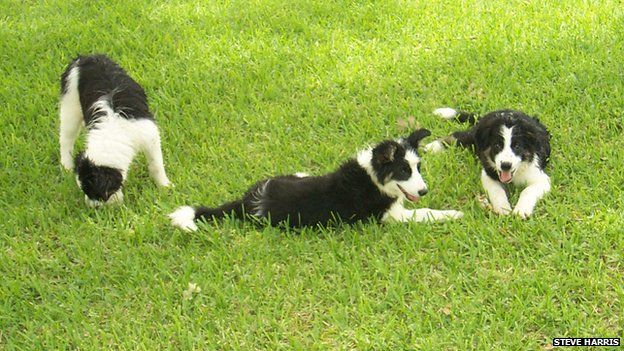Jealous wags: Dogs show envy is 'primordial' emotion
- Published

Jealousy is not just a human condition according to researchers, as it appears to be hard wired into the brains of dogs as well.
Scientists in California found that canines succumbed to the green eyed monster when their owners showed affection to a stuffed dog in tests.
Some experts have argued that jealousy requires complex cognition and is unique to people.
But the authors say their work shows it may also come in a more basic form.
These findings probably won't be a major surprise to anyone who's ever owned a dog, but the team say this is the first experimental test of jealous behaviours in man's best friend.
Human jealousy is a complicated emotion, requiring a "social triangle" and usually arising when an interloper threatens an important relationship.
It is said to be the third leading cause of non-accidental homicide across cultures.
Building on research that shows that six month old infants display jealousy, the scientists studied 36 dogs in their homes and video recorded their actions when their owners displayed affection to a realistic-looking stuffed canine.
Faux fido
Over three quarters of the dogs were likely to push or touch the owner when they interacted with the decoy.
The envious mutts were more than three times as likely to do this for interactions with the stuffed dog compared to when their owners gave their attention to other objects including a book.
Around a third tried to get between the owner and the faux fido, while a quarter of the put-upon pooches snapped at the dummy dog.
"Our study suggests not only that dogs do engage in what appear to be jealous behaviours but also that they were seeking to break up the connection between the owner and a seeming rival," said Prof Christine Harris from University of California in San Diego.
"We can't really speak to the dogs' subjective experiences, of course, but it looks as though they were motivated to protect an important social relationship."
The researchers believe that the dogs understood that the stuffed dog was real. The authors cite the fact that 86% of the dogs sniffed the toy's rear end, during and after the experiment.
Jealousy, according to the authors, may have evolved in species that have multiple dependent young that concurrently compete for food and affection.
The argue that jealousy might give an advantage to a young animal that is not only alert to the interactions between its siblings and its parents but is motivated to intervene.
"Many people have assumed that jealousy is a social construction of human beings - or that it's an emotion specifically tied to sexual and romantic relationships," said Prof Harris.
"Our results challenge these ideas, showing that animals besides ourselves display strong distress whenever a rival usurps a loved one's affection."
The research has been published in the journal, PLOS One.
Follow Matt on Twitter @mattmcgrathbbc.
- Published21 February 2014
- Published24 May 2013
- Published17 December 2012